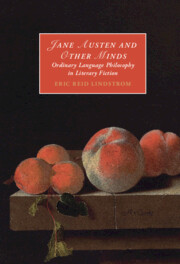Book contents
- Jane Austen and Other Minds
- Cambridge Studies in Romanticism
- Jane Austen and Other Minds
- Copyright page
- Contents
- Acknowledgments
- Abbreviations
- Introduction
- Chapter 1 Austen and Austin
- Chapter 2 Intelligible Community
- Chapter 3 Sense and Sensibility and Suffering
- Chapter 4 Pride and Prejudice and the Comedy of Perfectionism
- Chapter 5 Perlocutionary Entailments
- Chapter 6 Emma and Other Minds
- Chapter 7 Persuasion, Conviction, and Care Jane Austen’s Keeping
- Notes
- Bibliography
- Index
- Cambridge Studies in Romanticism
Chapter 6 - Emma and Other Minds
Published online by Cambridge University Press: 04 November 2022
- Jane Austen and Other Minds
- Cambridge Studies in Romanticism
- Jane Austen and Other Minds
- Copyright page
- Contents
- Acknowledgments
- Abbreviations
- Introduction
- Chapter 1 Austen and Austin
- Chapter 2 Intelligible Community
- Chapter 3 Sense and Sensibility and Suffering
- Chapter 4 Pride and Prejudice and the Comedy of Perfectionism
- Chapter 5 Perlocutionary Entailments
- Chapter 6 Emma and Other Minds
- Chapter 7 Persuasion, Conviction, and Care Jane Austen’s Keeping
- Notes
- Bibliography
- Index
- Cambridge Studies in Romanticism
Summary
Chapter 6, “Emma and Other Minds,” discusses Austin’s critique of certainty in “Other Minds,” and his account of the pluralities of verbal action in the essays “Pretending” and “A Plea for Excuses.” Austin’s arguments in these essays possess not only cognitive and epistemological dimensions; they are supremely rich investigations of moral thought and sociality: dimensions of life that produce endless opportunity for mistake. Illuminating Austen’s Emma, Austin’s rejection of the exclusive dimension of certainty driving so much modern theory of knowledge goes hand in hand with his recognition of the epistemological character of social responsibility. The novel’s famous scene at Box Hill enacts these dynamics in a tour de force of recursive layers. The ordinary-language philosophical topics treated in this chapter include moral luck, pretending, and the self-problematizing division (made famous by Paul de Man’s reading of Rousseau) between exculpatory confessions and pleasure-taking excuses. The chapter begins with Austin’s and Austen’s joint critique of certainty. It ends by dislodging omniscience as a placeholder of philosophical value.
Keywords
- Type
- Chapter
- Information
- Jane Austen and Other MindsOrdinary Language Philosophy in Literary Fiction, pp. 161 - 199Publisher: Cambridge University PressPrint publication year: 2022



